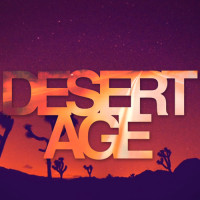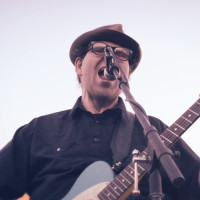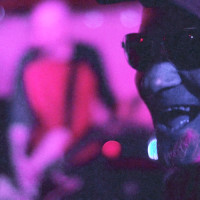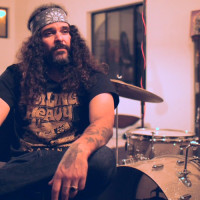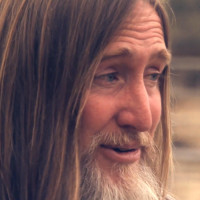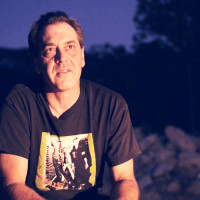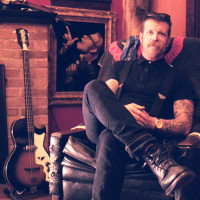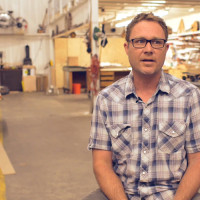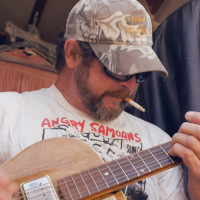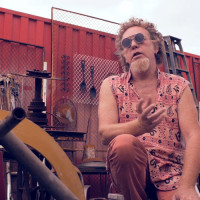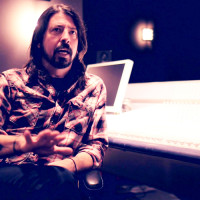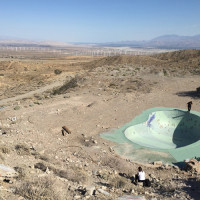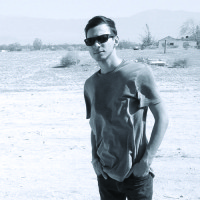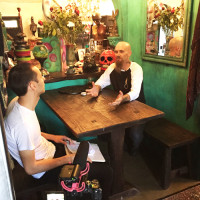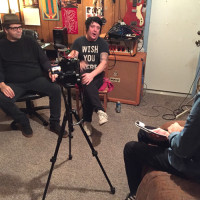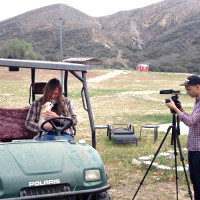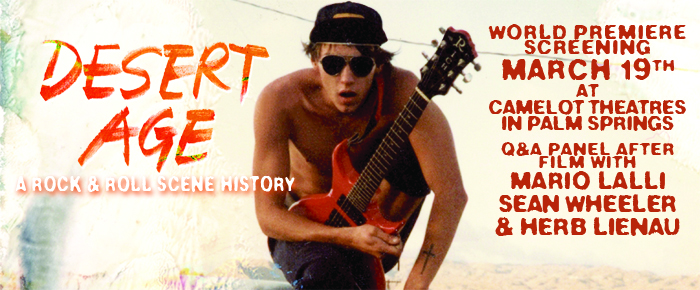
By Noe Gutierrez
The history of the desert music scene has been well documented throughout the past several years and its relevance is undisturbed by the passion desert rock fans in Europe have for the music. They demonstrate this by continuing to flock to events like ‘Desert Fest’. The feature length documentary film “Desert Age: A Rock and Roll Scene History” takes a historical approach to the desert music scene by chronicling some of the legends themselves. Using first-hand never-before-seen interviews, archival and personal histories, Director Jason Pine and team, focus on the legendary and mythological stories as told by the purveyors themselves.
The film title itself establishes the purpose of the film. Pine explains, “The strength of our film is not retrospective. It takes you through the story in real time. The film takes place moment to moment, like you’re going through a narrative. Here’s what happened, it doesn’t need a revisionist perspective, it occurs in the present moment. Here’s all the stuff we found. We avoided trying to fit music into one genre. The premiere is great for desert music fans to get together to celebrate this music. It’s great to be a part of it but it’s not about us.”
On Saturday, March 19, 2016 at 6:30 p.m. the world premiere of “Desert Age: A Rock and Roll Scene History” will take place at Camelot Theaters in Palm Springs, California. Following the film a Q&A will occur with the films primary figures, Mario Lalli (Fatso Jetson), Sean Wheeler (Throw Rag), Herb Lineau (Dead Issue) and Director, Jason Pine. The screening is sold out and there is a waiting list where you can submit your name at desertagefilm.com. There will be several archival photos on display in the lobby as well as limited edition screen prints and other merchandise for sale in the lobby. The price of admission includes a raffle drawing also. Alcohol will be sold with valid ID and concessions will be open. Running time of the film is 75 minutes. Pine spells out why it was important to premiere the film in the desert. “This is a community event. Our goal was to premiere it in the desert and nowhere else. It’s for the community. That’s number one for us, first and foremost.”
Desert Age is the first in-depth feature documentary about the history of the California desert rock and roll scene from the early 1980s and 1990s. It is the first to feature exclusive interviews with Dave Grohl, Josh Homme, Mario Lalli, Sean Wheeler, Jesse Hughes, Brant Bjork and additional members of Kyuss, Queens of the Stone Age, Fatso Jetson, Yawning Man, Suntrash and many more. The film was officially selected for the Bellingham Music and Newport Beach Film Festivals. Coachella Valley Weekly recently spoke with the film’s director and a few of the featured musicians in the film.
Jason Pine:
Pine and his friend and producer Trevar Cushing are from western Pennsylvania. Pine honed his passion for filmmaking at the California Institute for the Arts. His graduate degree is in film production. “Film is a great way to get all photo, videos and music together.” Their love for counterculture topics led them to desert music. “We’ve been working in counterculture topics like skateboarding, music and snowboarding for years. This is just an extension of smaller projects that we’ve always pursued just in a feature length format.”
Introduction
While attending grad school Pine went to a Queens of the Stone Age show promoting their first album. Pine shares further, “The story I always tell is when I was out in California for graduate school I went to QOTSA first album tour and I struck up a conversation with the guy next to me. I asked him what other bands he listened to. He went on to share about all the desert rock bands. I had no idea what he was talking about. That conversation got the gears turning. Then I looked it up on Wikipedia and everything was wrong. You look up desert rock on Wikipedia and it just says Palm Desert scene.”
The Film
Filming of Desert Age began in 2012 and was completed in the fall of 2015. “The production itself took a year and a half. That included constant trips to the desert. Mario and Gary Arce were the first to be filmed together. We met them at Thunder Underground Studios in Palm Springs. We even went to Fargo, North Dakota to interview Uncle Paul! Mario and Sean are the central characters. The film does not fit into the category of stoner rock; it’s about the bands and the scene itself. It’s a great way to categorize so people can understand it. I don’t believe that it limits an understanding of what it really is; it’s art, freedom and expression, it doesn’t diminish or devalue what it is, and these guys are extremely talented musicians. We crafted the film to those standards. The film is a great way for people to be exposed to what happened. It took an outsider to do something like this. We took an objective look and spoke with the people that were there. The trust for the project came from our word that we’re not going to include people who weren’t there. The movie is a great way for people to be exposed to what happened. It’s ‘scene rock’; a bunch of things happening at the same time. It’s not about any one band.”
The Musicians & Their Music
“This music transcends genres. It’s an art movement. My level and respect for what these guys were doing is immense. I didn’t fully understand what it takes to be a musician. They transcended it and made me think differently about art in general. I learned the band names don’t matter either. A lot of these bands have a lot of moving parts to them which made it complicated to complete a narrative timeline. That was one of the editorial challenges. It was unreasonable to interview all the bands and their respective members. We kept it general.”
“I really like talking to people in bands. I hate this shit where you can’t interact with them and if you do they look at you like you’re weird. You like what they do and you want to have an opportunity to talk to them about their process. I hope people use the premiere as an experience to interact with the musicians. They are happy to talk to people.”
Respect
“With regards to people’s music attitudes, we are used to getting music categorized. That’s a very commercial oriented ideal, to package something. Throughout the course of this process my level of respect about what these guys were doing was so hard to understand because I didn’t fully understand what it really meant to be a musician which makes these people unique. They transcended the scene. These guys have a level of understanding of music that is beyond the comprehensible. It’s laughable when people try to categorize them. ‘Desert Rock’ is a great way to casually talk about music from the desert, but as a serious investigative concept, it doesn’t wrap it up well.”
“This process made me think about art in general and expressing yourself. Not worrying about labels and names. I learned that the names don’t matter. They’re chasing music as an idea and as an expressive art form. You should be willing to let go of things that box you in. Pure, raw expression, that’s what makes this music so incredible.”
Mario Lalli on Jason:
“He just wanted to get together to talk about the old days and go over some facts and stories. We talked about the really early days when we first started deciding to play music. Not even when we had bands in action, when we were just starting. How we went from being kids to riding bikes and skateboards to playing music as a means of entertaining ourselves. Going that far was kinda refreshing. I was curious; I was thinking this will be interesting. Jason was coming at it from a more historical angle. We have a lot in common with Jason, because he’s a skateboarder among other things. I was curious as to how it was gonna pan out with another movie about our music scene. It’s really cool for a guy like Jason; by making a film like this he became a part of the story himself. It’s a very accessible music scene. Jason was able to immerse himself in it. People are really down to earth in this music scene and are willing and happy to embrace someone who is interested and gives a shit about it.”
On Inspiration:
“I was inspired by my brother. He turned me on to all kinds of music. The music that inspired me was a lot of classic rock and punk rock from New York City, San Francisco and Los Angeles. A lot of these guys were older than me. The music and the musicians are very tangible things. Chris Goss, Dave Grohl and guys like them were remotely and peripherally affected and influenced not directly, but indirectly by our scene. The humility in the desert music scene and the attitude still remains. We are welcoming. I am amazed by it.”
On Desert Age:
“I think it’s really good. I was very impressed by it. It was very well made and told an in-depth, balanced and interesting story. This is the most difficult thing to encapsulate, a strange hard to pin music scene that wasn’t really that successful. The most successful thing about it is that it influenced a bunch of people that aren’t really successful either. It’s truly an underground phenomenon. It’s a hard story to tell. What’s harder is to grab all these characters from all walks of life and get them all to tie the whole thing together. My hat’s off to them for following through and making a cohesive story. Jason did an excellent job of researching the Coachella Valley just as a place as well.”
On Hope:
“I’m really excited about the exposure the film will give to all the musicians in the film. It’s gonna create more excitement for music coming from the desert. I like the mystery about it. I like the phenomenon of music scenes. I believe in that. I grew up believing in it. I don’t like to become so jaded and ego driven. I think it’s cool that people are gonna see this cool story about us and this place that we grew up in. I think it’s a great story. I’m proud of it. I’m proud of the music that came out of the desert. I’m really proud of music that I’ve been a part of and that my friends are a part of. I’m proud of all the bands that were successful. I think they made amazing music and I think they are absolutely original and creative people. The more people that can see where and how that happened is bitchin’! What I didn’t expect watching this movie was to find the interesting story going on here. Jason managed to do something. He went the extra mile to find that and make it clear and doing it in an hour and a half. I love that little window that it gives me, that secret little insight. I’m grateful for it and I learn from it. It’s a wonderful opportunity for people to learn and get excited about music.”
Sean Wheeler:
“He who knows the wizard’s nose knows the wizards knows.”
Scott Reeder:
“I’m not sure if I was the very first interview for the film, but it seemed that Jason really wanted to get to the roots of things, so I did my best to point him upstream. The guys that were just a little ahead of me were my band mate Cary Abelardo from Dead Issue and our mutual band mate Mike Bates from Subservice around 1981 and Paul and Rob from Target 13, who I played with for a short time when I was 16. I’m really stoked that those guys were involved. They had a huge influence on my path. As I told Jason, everyone’s version of how things unfolded will be different. I’m looking forward to finally seeing how Jason made any sense of it all.”
Herb Lineau:
“It’s kind of neat that there is a genuine interest in what we, a bunch of bored kids now in our 50s, did as teenagers to pass the time. Back then, the general consensus of parents and ‘normal’ peers was that we were all just making noise (not music) and it was a complete waste of time. Looking back I guess that’s partially true but for all of us it ran much deeper than that. There was no shortage of ridicule (thanks to the ‘punk’ episodes of CHiPs, Quincy, and the like). These days you wouldn’t think twice about someone with dyed short hair or wearing thrift clothes but back then it was like, “Whoa!”, “Freak!” In hindsight, I think it made us tougher and built character, but back then it kinda sucked.”
Ian Taylor:
“I’m stoked to see what Jason and the crew put together for their take on the dez. When I hung out with them they seemed to care about getting it right, talking to as many people involved in the dirt rock scene over the decades, not just that small window of the late 80’s – early 90’s that we were a part of. The trailer looks fun and I’m a big fan of Sean, Mario and Herb, who I hear are doing some extreme freestyle talking.”
“When I heard it was at the Camelot, I immediately had flashbacks of ditching class from Palm Springs High School, across the street. We used to skate an abandoned pool behind the theater and get into all kinds of trouble in the parking lot of that old crappy mall. I Google mapped it to see if it was the same place; it looks a little different now, like everything in the desert. I’ll get lost on the way there, hope I can make it.”
Damian Lautiero:
“It was an honor to be asked to participate in the film. When I first heard about it, I think my initial reaction was why would anyone want to see a movie about a bunch of bored knuckleheads partying in the desert? I assumed every town had some kind of ‘underground’ scene where kids made their own fun. After speaking with Jason and understanding the way he was going to approach the story, I was impressed first of all, with how accurate his knowledge of the bands and the history was, but also with the passion he displayed for the art that was created here. I may be a bit biased, as I have been a part of the desert music scene since childhood, which is something I don’t take for granted. Some of my favorite bands of all time hail from our desert, and I am blessed to call many of them my friends. It’s an awesome thing to see them recognized for their contribution to the music world.”
Scott Brooks:
“They didn’t know who I was. It was great. They concentrated on new footage. I showed them the Nude Bowl and other important landmarks. I am stoked to see it and be amongst all my friends revisiting and making history.”
Robbi Robb:
“If there is one thing I hope people get from this movie is that, desert stoner rock is not a ‘genre’ but a journey by rattlesnake to a place where there are no road signs, no corporate record labels, no lawyers, no grey suited executives; yeah, there are no compromises. You see ‘there ain’t no one for to give you a name’. When some people see a documentary about the horrors of slaughter houses they become vegetarians – this documentary may inspire many to become stoners!”
Nico Flores:
“I saw the trailer and thought it looked pretty awesome! There’s a clip of me on stage in it so I’m stoked! But other than that I don’t know much about it besides the fact that it features all the desert pioneers whom I love. I can’t wait to see it.”
Gary Arce:
“TV and film is chewing gum for the eyes. Music is a triple scoop of your favorite ice cream for the ears.”
For more information visit the website www.desertagefilm.com



































